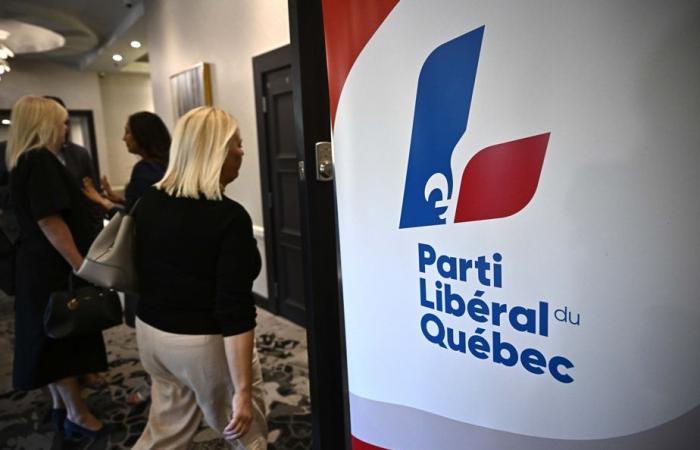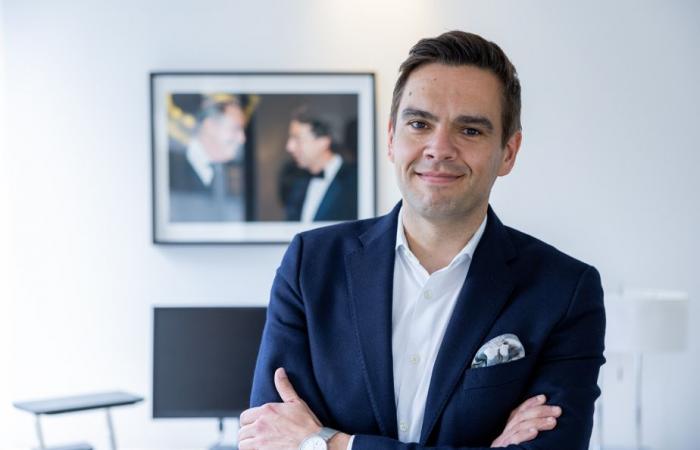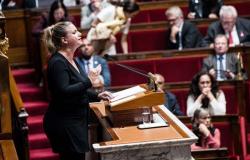Granting a third of the votes to young people aged 25 and under in the race to elect the next leader of the Quebec Liberal Party is a matter of debate. Worried about a possible “demographic imbalance” going “against the values” of the party, one faction proposes to reestablish the “one member, one vote” rule.
Published at 0:00
What you need to know
- A third of the votes to elect the next leader of the Quebec Liberal Party are reserved for members aged 25 and under.
- This weight is questioned by activists who instead want a “one member, one vote” approach.
- Almost all party leadership candidates have already made it clear that they will strongly oppose the proposal.
“It’s not democratic, it doesn’t represent all the members of the party, it’s discriminatory,” says the president of the Montarville liberal association, Michèle Bureau.
His group therefore introduced a proposal which will be presented to members at the next party congress, which will open on November 8, in Lévis.
If adopted, this proposal would have the effect of modifying the constitution of the PLQ and therefore the rules of the race for the succession of Dominique Anglade which must be officially launched in mid-January.
Since the 1970s and the creation of the PLQ Youth Commission, young people aged 25 and under have occupied a preponderant place in party bodies. A third of the places are reserved for them in each of the delegations called to attend party congresses to vote on the proposals.
However, the rules for the next leadership race, as presented last April, go even further and provide that a third of the votes in the universal ballot to elect Dominique Anglade’s successor be reserved for its members aged 25 and under. (see box).
“Equality for all”
“This is where there is really a demographic imbalance,” worries Michèle Bureau, who therefore judged that the right moment to launch a debate on this subject had come. “It really goes against the values of our party, that is to say equality for all, regardless of our age, our gender, our religion,” she said.
While refusing to name them, the association president believes that certain candidates would benefit from this new rule.
Michèle Bureau denies wanting to reduce the place of young people in the PLQ. “Young people will always have their place in congresses, in decisions on party positions. The only exception would be for the leadership vote,” she insists.
Her proposal would be supported by other constituency associations and several young activists whom she also refuses to identify.
The president of the PLQ, Rafael Primeau Ferraro, confirms that a proposal to review the weight of the youth vote in the next leadership race has indeed been presented to the party authorities.
Without commenting directly on it, he recalls that the political group is the only one, to his knowledge, to be endowed with such a way of doing things, an aspect “positive and which has been positive in the past”, as the demonstrates the involvement of several former members of the Youth Commission within the PLQ.
Candidates oppose each other
But this proposal is far from passing like a letter in the mail when announced candidates have already made it known that they will firmly oppose it.
This is the case of the former president of the Federation of Chambers of Commerce of Quebec, Charles Milliard, who received the support of more than 80 young liberals before even officially launching.
PHOTO MARCO CAMPANOZZI, ARCHIVES LA PRESSE
Quebec Liberal Party leadership candidate Charles Milliard
Quebec youth are at the heart of the political history of the PLQ. Wanting to decrease [son] influence in our bodies would be a declaration of lamentable failure. We are doing politics for future generations, so we must redouble our efforts to encourage them to get involved in politics to advance their ideas.
Charles Milliard, candidate for leadership of the PLQ
MP Frédéric Beauchemin recalls that the 33% of the votes held by the young Liberals “is in line with the rich legacy and legacy of Robert Bourassa”. “In all circumstances, I will oppose its withdrawal and abolition. In fact, if one thing has allowed our party to remain relevant throughout all these eras, it is listening to young people! “, he said.
The team of former federal minister Pablo Rodriguez, a former member of the national executive of the Youth Commission, affirms for his part that he “cannot [s]imagine supporting such a resolution.” “The strength of the young people of the CJ is one of the things that sets us apart from other parties. »
Former Montreal mayor Denis Coderre has not taken a position for the moment. His team intends to study the proposal shortly, confirmed its spokesperson, Christian Therrien.
The members’ vote will be held next spring over a period of six days, between June 9 and June 14, the day when a leadership congress will be held in Quebec.
How does the vote work to elect the next leader of the PLQ?
The system put in place for the election of the next leader of the PLQ aims to grant the same importance to the 125 constituencies of Quebec. Each of the associations representing these constituencies therefore receives 2000 points, for a total of 250,000 points. These 2000 points are allocated to candidates according to the percentage of votes from members aged 26 and over that they receive. At the same time, 125,000 points are granted to members aged 25 and under, regardless of their constituency, which are distributed among the candidates according to the percentage of votes they receive among young people. In other words, their vote is equivalent to a single constituency worth 33% of the votes.







